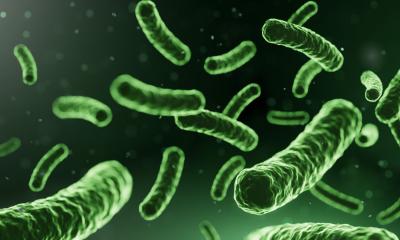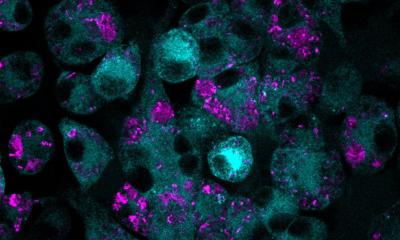E. coli
Using harmless bacteria to fight cancer
Several bacterial species have pledged promise in fighting tumors. However, most of them are pathogens. In order to use them as a weapon against cancer and other diseases in humans, researchers must find a balance between their therapeutic aggressiveness and safety for the patient. To overcome this problem, researchers at the Helmholtz Centre for Infection Research (HZI) have shifted their focus from pathogenic bacteria to those with a proven safety profile, namely probiotic E. coli. First tests in mice indicate that the probiotic bacteria were indeed efficiently targeting the tumors without generating a toxic effect. The research opens the door to a new approach in fighting cancer.

Cancers are among the leading causes of morbidity and mortality worldwide. Despite improving treatments such as chemotherapy the disease is still advancing. According to statistics of the World Health Organisation from 2012 (WHO) the number of new cases is expected to rise by about 70 percent over the next two decades. Thus, there is an urgent need for new therapeutic approaches. One possibility is to use pathogenic bacteria such as Salmonella. ‘However, there is one big problem when applying them to human patients’, says Dr Dino Kocijancic, scientist in the department of “Molecular Immunology” at the HZI. ‘We have to modify the bacteria in a way that they do not cause harm. The first clinical trials showed that this is possible but hardly without limiting the therapeutic effects’. In this particular case, the attenuation for safety was too extensive so that the therapeutic power was lost.
To solve this problem the scientists tried an opposing strategy by using probiotic bacteria, which are beneficial rather than harmful to the human host. Kocijancic and his colleagues chose E. coli probiotics which are used by millions of people to treat intestinal disorders. Furthermore, those bacterial strains are already well-studied making it easy to give them new properties and functions.
When testing their approach in tumor bearing mice the researchers found that the E. coli probiotics, notably Symbioflor-2, were very efficient in targeting tumors. ‘This indicates that they are holding a great potential in solid tumor therapy even though their therapeutic potency might be slightly lower than that of Salmonella’, says Kocijancic. ‘However, their superior tumor specificity and the fact that they do not need to be weakened will allow us to use them as bio-vehicles delivering therapeutic molecules into tumors’.
The research indicates that a probiotic therapeutic strain more readily tolerated by an immune compromised cancer patient may allow for systemic application and higher dosing compared to the vastly explored attenuated Salmonella. ’We are sure that this will prove correct in further tests. Thus, our new approach will more readily utilize the advantages of bacteria mediated tumor therapy’, says Dr Siegfried Weiss, head of the research group.
Publication:
Therapy of solid tumors using probiotic Symbioflor-2 – restraints and potential. Dino Kocijancic, Sebastian Felgner, Michael Frahm, Ronja-Melinda Komoll, Aida Iljazovic, Vinay Pawar, Manfred Rohde, Ulrike Heise, Kurt Zimmermann, Florian Gunzer, Juliane Hammer, Katja Crull, Sara Leschner, Siegfried Weiss. Oncotarget; 2016 Mar 10. DOI: 10.18632/oncotarget.8027.
Source: Helmholtz Centre for Infection Research (HZI)
25.04.2016










